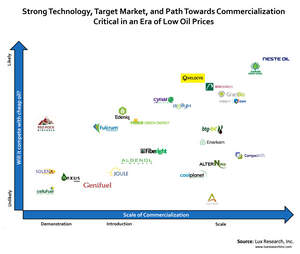BOSTON, MA--(Marketwired - May 13, 2015) - While alternative fuels like biofuels had obvious appeal when oil prices were well over $100 a barrel, the plummet in oil prices to $50 levels can threaten the cost-competitiveness of alternative fuels. However, many developers have planned for low oil prices and some will still be able to achieve cost reductions needed to thrive, according to Lux Research.
Lux Research evaluated 25 alternative fuel producers to identify the ones most likely to compete with cheap oil (Read more on Lux Research's methodology for assessing start-ups and other innovation-driven new business initiatives). Renewable diesel producers Neste Oil and Diamond Green Diesel, gasification specialist Red Rock Biofuels, and Edeniq, which makes cellulosic ethanol, were among 13 alternative producers of fuels best positioned for cheap oil.
"$50 oil was never an afterthought for technology developers," said Yuan-Sheng Yu, Lux Research Associate and the lead author of the report titled, "How Alternative Fuel Companies Will Compete with $50 Oil."
"Many companies have technology roadmaps for cheaper alternative fuels. Not all of them will actually achieve that benchmark, but some will -- while others will find alternate markets or, ironically, use support from oil majors to survive until prices rise again," he added.
Lux Research analysts used its database of 400 alternative fuel producers to pick 25 companies -- from seven technology families, four feedstock types and three stages of development -- for detailed analysis. Among their findings:
- Neste Oil, Diamond Green are benefiting from cost cuts. Thanks to lowered production costs achieved through feedstock diversification, renewable diesel producers Neste Oil and Diamond Green Diesel were the clear leaders in Lux's model. On the other hand, Solena Biofuels and Joule Unlimited were among the laggards on account of delayed production and commercialization.
- Developers move to alternate markets. Amid low oil prices, high-profile companies such as Solazyme, Amyris, and Gevo have shifted decisively toward specialty chemicals and nutraceuticals this year. Sapphire Energy also has shifted away from fuels and now targets nutraceuticals, producing Omega-3 EPA from its algae.
- Oil majors remain a pillar of support. Believing cheap oil to be a short-term phenomenon, oil majors have remained prominent supporters of alternative fuel developers across various technology platforms. For example, Total has added to its existing portfolio in biofuels and bio-based chemical companies by investing in Renmatix, a biomass-to-sugars company.
The report titled, "How Alternative Fuel Companies Will Compete with $50 Oil," is part of the Lux Research Alternative Fuels Intelligence service.
About Lux Research
Lux Research provides strategic advice and ongoing intelligence for emerging technologies. Leaders in business, finance and government rely on us to help them make informed strategic decisions. Through our unique research approach focused on primary research and our extensive global network, we deliver insight, connections and competitive advantage to our clients. Visit www.luxresearchinc.com for more information.
Contact Information:
Contact:
Carole Jacques
Lux Research, Inc.
617-502-5314
carole.jacques@luxresearchinc.com
